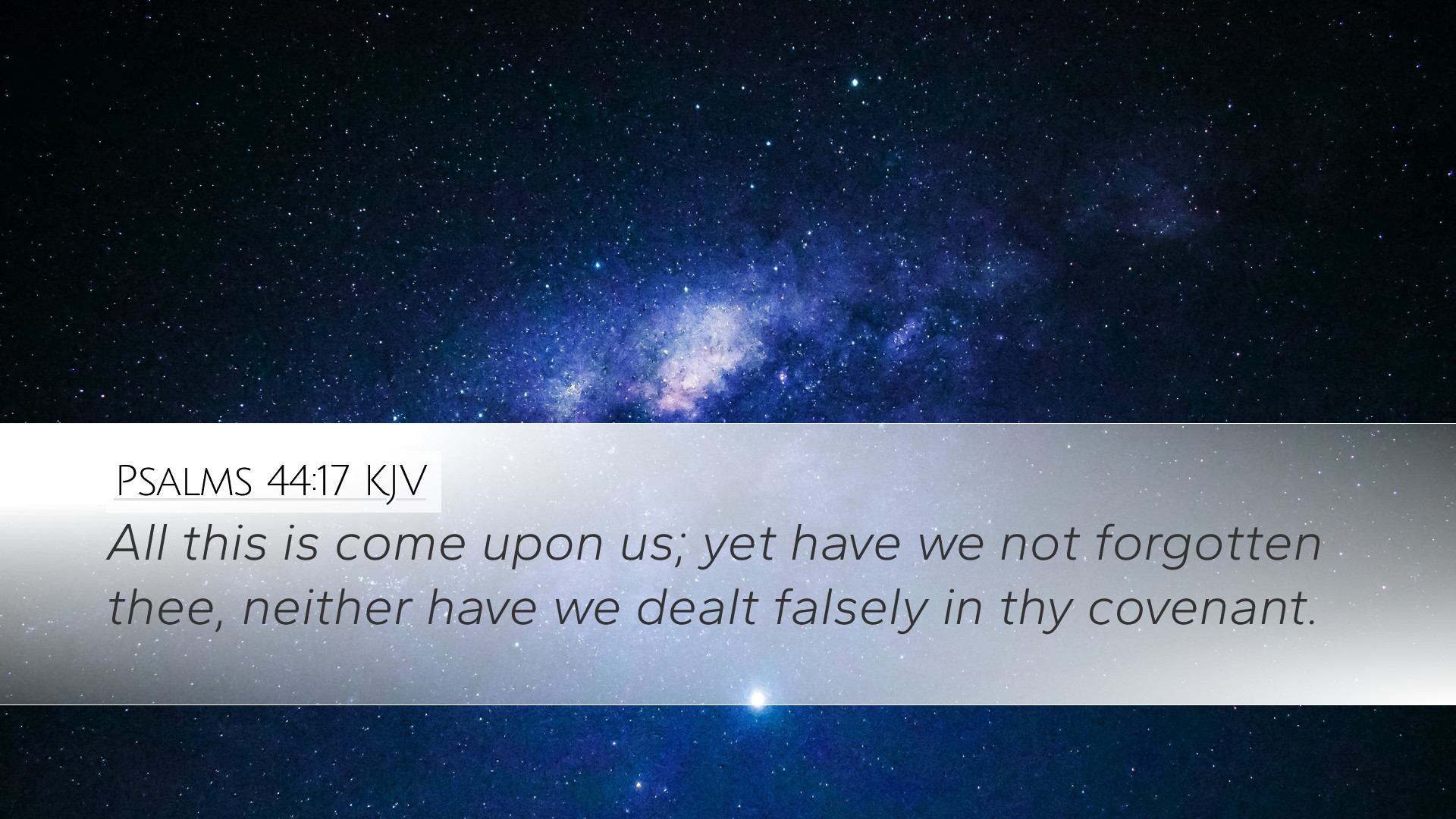Commentary on Psalms 44:17
Verse: "All this is come upon us; yet have we not forgotten thee, neither have we dealt falsely in thy covenant."
Introduction
This verse from Psalm 44 serves as a poignant reflection on the human experience of suffering, faithfulness, and the enduring nature of God's covenant. It presents a tension between the reality of distress and the steadfastness of devotion, serving as a crucial reminder to pastors, theology students, and scholars of the biblical narrative of perseverance amidst trials.
Contextual Framework
Psalms 44 is a communal lament, expressing the anguish of Israel during a time of national crisis. The psalmist recounts past victories through divine intervention, contrasting them with the current state of disgrace and defeat. It raises vital theological questions about why the righteous suffer, even when they remain faithful to God.
Thematic Analysis
- Faithfulness Amidst Suffering:
As noted by Matthew Henry, this verse illustrates the struggle of God’s people who find themselves in dire situations despite their fidelity. It emphasizes that true devotion does not guarantee exemption from trials; instead, it reinforces the seriousness of covenant commitment even when circumstances seem bleak.
- The Importance of Remembrance:
According to Albert Barnes, the phrase "yet have we not forgotten thee" indicates an active recollection of God’s nature and past acts of deliverance. This acknowledgment is vital for maintaining hope and faith, suggesting that remembrance of God's faithfulness provides strength to endure current tribulations.
- Understanding Covenant Relationships:
Adam Clarke expounds on the concept of covenant, stressing that the psalmist asserts their innocence in breaking the covenant. This claim is significant, as it reflects the belief that unfaithfulness in relationship with God could explain suffering. Here, the psalmist desires assurance of God's presence and support in maintaining the covenant.
Exegetical Insights
The use of "all this" points to the various calamities faced by Israel, yet the resilience of faith is noteworthy. The phrase connects the experience of suffering to the communal identity and understanding of divine justice and mercy.
Key Aspects of the Text:
- Collective Identity:
The psalm reflects a corporate lament, underscoring the shared nature of Israel's struggles. It challenges the individualistic interpretations often found in contemporary theology, advocating for a more communal understanding of faith and suffering.
- The Resilience of Faith:
The expression of fidelity amidst despair serves as a profound theological statement. As highlighted by Matthew Henry, it asserts that true faith perseveres through trials by steadfastly clinging to God’s promises.
- God's Covenant Faithfulness:
The insistence on having "not dealt falsely" speaks not only to Israel's own faithfulness but also implies a reflection on God’s unwavering commitment to His people. The covenant relationship is reciprocal; while Israel is called to be faithful, God’s integrity ensures His promises endure.
Theological Implications
This verse invites deeper discourse on the nature of suffering in relation to divine covenant. It challenges believers to reflect on their faithfulness and the assurance of God's presence in adversity.
1. The Problem of Suffering:
The juxtaposition of suffering and faithfulness here is a theological conundrum that addresses the question of divine justice. As stated by Albert Barnes, it prompts believers to consider how suffering can coexist with devotion to God, leading to profound explorations in pastoral care and theological teaching.
2. Covenant and Community:
The communal language of this psalm underscores the importance of shared faith and collective remembrance of God's acts. It exhorts the church today to cultivate unity in the face of trials, reflecting on their corporate identity in Christ.
3. Affirmation of Faith:
Ultimately, this verse calls for an affirmation of faith despite external circumstances. The assertion of not forgetting God represents a commitment to spiritual discipline and communal worship, essential for sustaining faith through adversity.
Conclusion
Psalms 44:17 serves as a powerful reminder of the complexities of faith in the midst of suffering. The insights drawn from public domain commentaries resonate deeply, offering a multi-dimensional perspective that is both theologically rich and practically relevant for today's believers. This text calls us to reflect on our relationship with God, our understanding of covenant, and the ongoing nature of faith, urging us to remain steadfast and hopeful even in our darkest hours.


